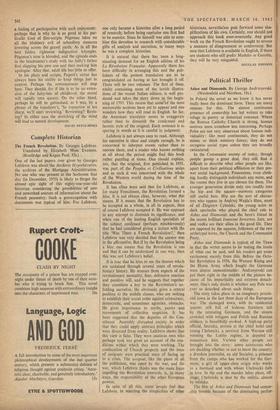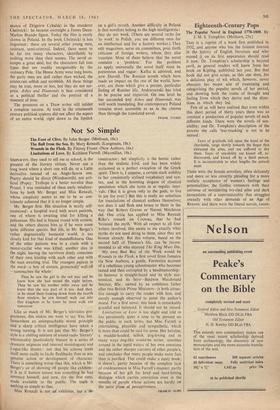Political Thriller
Ashes and Diamonds. By George Andrzeyevski. (Weidenfeld and Nicolson, 18s.)
IN Poland the novel as we know it has never really been the dominant form. There are many reasons for this. The almost continuous presence of censorship has led writers to take refuge in poetry or historical romance. Where the Roman Catholic Church is strong, human motives seem somehow less interesting. Perhaps Poles are not very observant about human indi- viduality: like most continentals, they do not mimic or think mimicry funny; they do not recognise social types unless they are broadly caricatured.
In the Communist society of today, though people gossip a great deal, they still find it difficult to describe what other people are like, apart from their political affiliation or their pre- war social background. Possessions, even cloth- ing, hardly distinguish individuals any more, and the rooms they live in are chosen for them. The younger generation divide only too readily into the hip and the square—outworn categories still useful here. Hip are the sort of charac- ters who appear in Andrzej Wajda's films, most of all Zbigniew Cybulski, the young actor in dark spectacles who played the chief role in Ashes and Diamonds and the hero's friend in the recent brilliant Innocent Sorcerers. Jazz, sex and vodka are their allies in the good life. They are opposed by the squares, followers of the two archetypal bores, the Church and the Communist Party.
Ashes and Diamonds is typical of the Thaw in that the writer seems to be testing the limits of what can be said, and his readers get some excitement merely from this. Before the Octo- ber Revolution in 1956, the Warsaw Rising and the Home Army which fought the Germans were almost unmentionable: Andrzeyevski can put them right in the middle of the picture be- cause of his impartiality and extreme detach- ment. One's only doubt is whether any Pole was ever so detached about such things.
The story takes place in an imaginary provin- cial town in the last three days of the European war. The damaged town, with its residential quarter still full of hideous furniture left by the retreating Germans, and the streets crowded with refugees and Polish and Russian soldiers, is beautifully evoked. A high-up party official, Szczuka, arrives at the chief hotel and young Chelmicki, a survivor from Warsaw still resisting the Lublin regime, is deputed to assassinate him. Various other people are brought into the story: sonic aristocrats who arc deciding whether or not to leave the country, a drunken journalist, an old Socialist, a prisoner from the camps who has worked for the Ger- mans, a girl of upper-class origin who works as a barmaid and with whom Chelmicki falls in love. In the end the murder takes place, off- stage; Chelmicki is shot by the militia, almost by mistake.
The film of Ashes and Diamonds had censor- ship trouble because of the dominating perfor- mance of Zbigniew Cybulski as the murderer Chelmicki: he became overnight a James Dean- Marlon Brando figure. Today the film is rarely shown in Poland. In the book Chelmicici is less important: there are several other young men, resistant, semi-criminal. Indeed, there seem to be far too many characters, identifiable by nothing more than their names: The novel at- tempts a great deal, but the characters fall into types that are readily recognisable by the ordinary Pole. The Home Army wear long boots, the party men are dull rather than wicked, the aristocrats selfish and snobbish. All these things may be true, more or less, but they do not sur- prise. Ashes and Diamonds is best considered as a political thriller and the portrait of a moment of time.
The pressures on a Thaw writer still inhibit a complete success. At least in the nineteenth century political sysitems did not affect the aspect of an entire world, right down to the lipstick on a girl's mouth. Another difficulty in Poland is that novelists belong to the high intelligentsia: they do not work. (There are several verbs for `to work' in Polish; you use different ones for an intellectual and for a factory worker.) They edit magazines, serve on committees, pour forth criticism of foreign writers, whom they also translate. Most of them believe that the novel contains a 'problem.' For the problem to apply universally the novel itself must be portentous and vague: Kafka is admired, and now Durrell. The Russian novels which have made an impact on the rest of the world, how- ever, are those which give a precise, particular feeling of Russian life. And rzeyevski has tried to be precise and impartial. On one level he has succeeded and Ashes and Diamonds was well worth translating. But contemporary Poland remains more accessible to us in the cinema than through the translated novel.
FRANK TUOHY



































 Previous page
Previous page